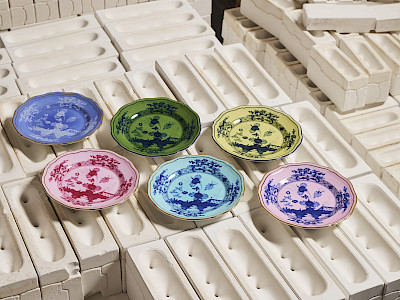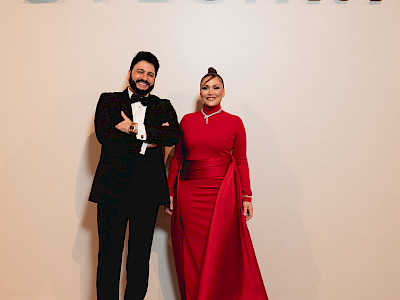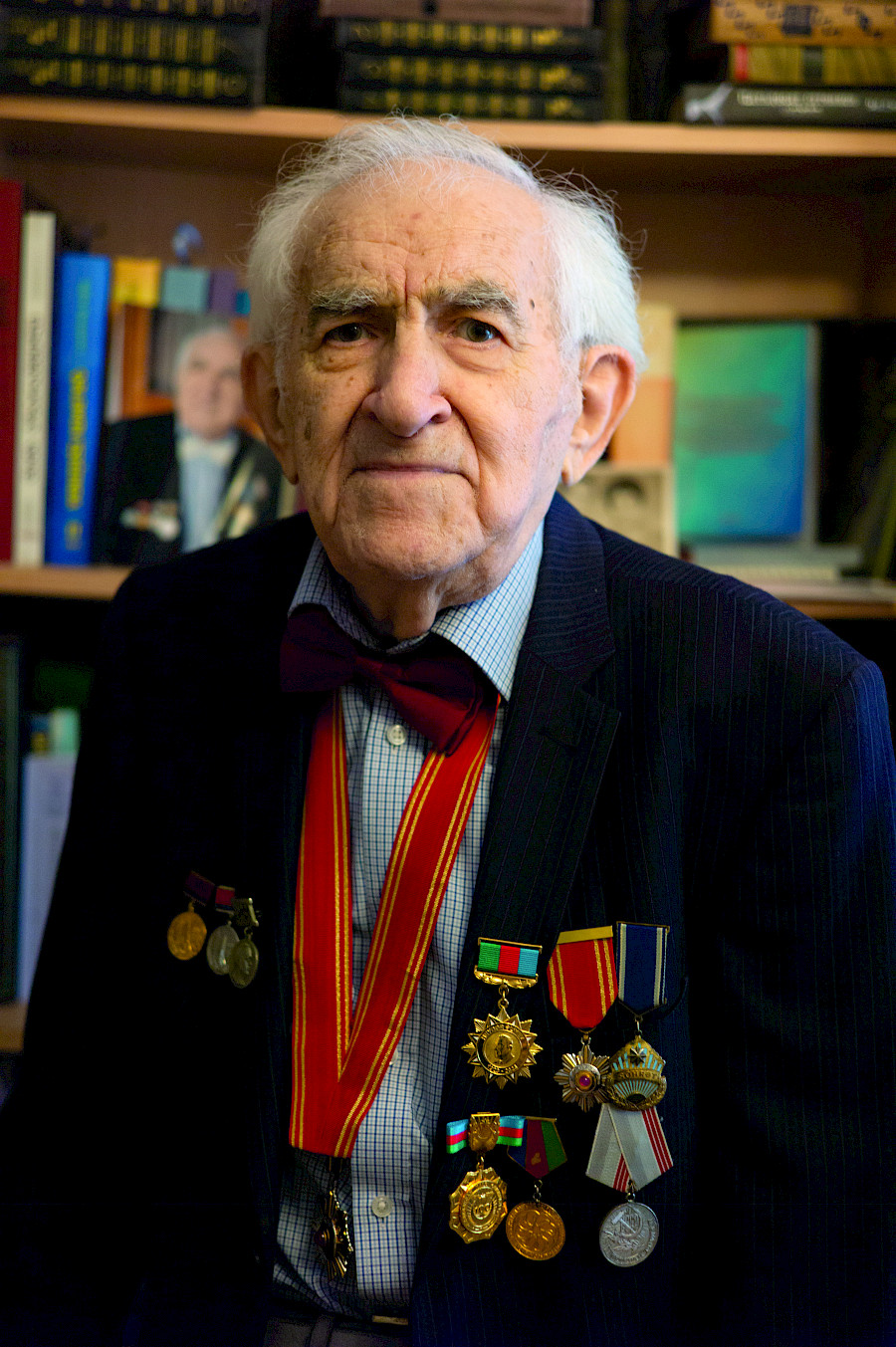
People's Artist of Azerbaijan, professor, holder of the "Shohrat" Order, renowned Azerbaijani composer Tofig Bakikhanov is the author of eight symphonies, five symphonic mughams, six symphonic poems, 26 concertos for different instruments, three one-act ballets, and three operettas co-authored with composer Nariman Mammadov. He has also composed over 100 songs performed by Flora Karimova, Zeynab Khanlarova, Ilhama Guliyeva,
Rauf Adigozalov, Mobil Akhmedov, and many others. In an interview with NARGIS Magazine, he talks about his long and fruitful journey, with every page of his unique life filled with a great love for Her Majesty Music.
You were born into the family of Abbas-Kuli-aga Bakikhanov, an outstanding representative of Azerbaijani science, history, and culture. How has this kinship influenced you?
Our family, represented by the Baku khans, has been serving the nation since the 19th century. Mirza Muhammad Khan II, the third khan of the Baku khanate, was the father of my great-grandfather Abbas-Kuli-aga Bakikhanov. Abbas-Kuli-aga was the founder of Azerbaijani scientific historiography and archeology, as well as the first Azerbaijani linguist. He initially lived with his family in Amirajan but later moved to Guba, where his maternal uncle, Fatali Khan, ruled. They resided in the village of Amsar, which now houses a museum dedicated to Abbas-Kuli-aga. I would like to mention that Abbas-Kuli-aga was a well-educated and well-read man who mastered several languages. He was invited to serve as an interpreter of Oriental languages at the office of the chief administrator of Georgia and participated in the Russian-Iranian peace negotiations in Turkmenchay. Bakikhanov left a rich scientific, philosophical, and literary legacy. His work "Gulistan-i Iram" was highly praised by the emperor, who awarded him a diamond ring and a monetary reward. Bakikhanov lived in Warsaw for over six months, where he became acquainted with Olga Sergeyevna Pavlishcheva, the sister of A.S. Pushkin. At her request, Bakikhanov delivered a letter to the Pushkin family in St. Petersburg and in May 1834 met Alexander Sergeyevich Pushkin, who then introduced him to the composer Glinka. The Institute of History of the National Academy of Sciences of Azerbaijan was named in his honour. In 2014, the 220th anniversary of Bakikhanov was celebrated in Azerbaijan.
Did you inherit your love of music from your father?
My father, Ahmed aga Bakikhanov, was a famous tar player and a prominent figure in the musical sphere. He was the People's Artist of Azerbaijan SSR (1973), the founder of the folk instruments ensemble, Honoured Teacher of Azerbaijan SSR (1943), and Honoured Art Worker of Azerbaijan SSR (1964). We lived near Nizami metro, in a house that is now a museum of folk musical instruments. Next door lived Uzeyir Hajibeyli, and our families were close friends. His wife was very hospitable, and we often visited them. At Uzeyir Bey's invitation, my father began teaching at the conservatory.
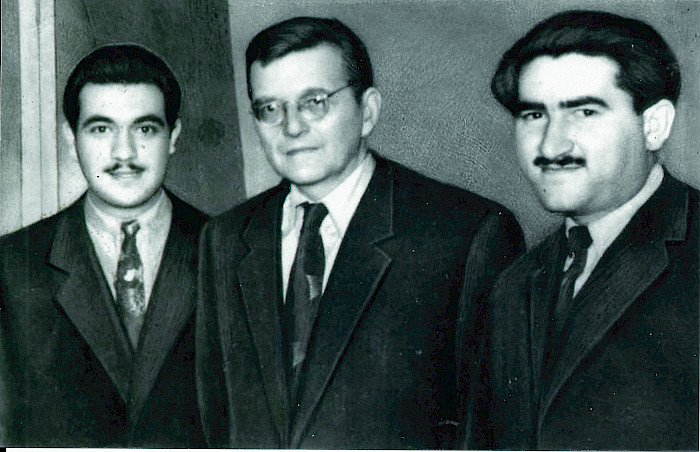 |
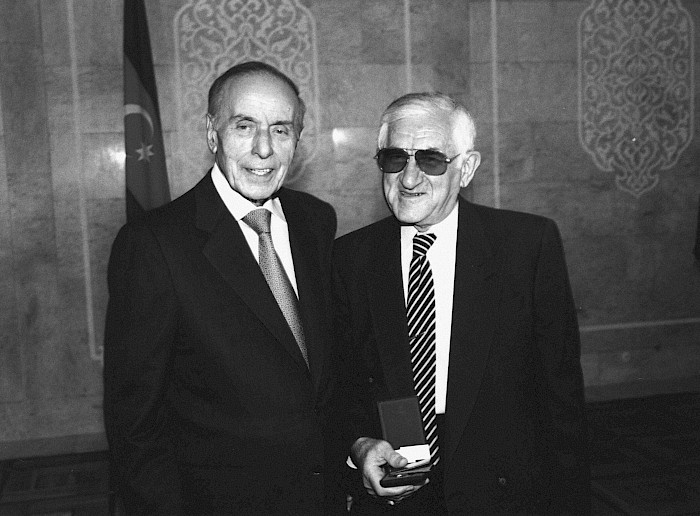 |
Then, how did your musical journey begin?
Once, Uzeyir bey told my father that there were enough musicians who could play folk instruments, but there was a need for performers of European music. He suggested that my father have his three children
– my brother, sister, and me – study violin, cello, and piano. Dad agreed. At that time, there was a music school at the Conservatory (now the Bulbul School), and all three of us enrolled. From the 3rd to the 10th grade, Uzeyir Hajibeyli attended all my school performances and concerts, always supporting me. I often performed at state events and concerts. For example, in 1947, during the celebration of Nizami's 800th anniversary at the Opera Theatre, many world leaders gathered, including Broz Tito. I played a difficult piece – Vieuxtemps' Concerto No. 4. I also performed at the Congress of Union of Composers in front of Lev Ginzburg and at many other events with top officials in attendance.
Then there was a conservatory?
I was preparing to enter the conservatory when Uzeyir Hajibeyli, then the rector, informed me that I was accepted without entrance examinations. I joined Professor Bretanitsky's violin class. At that time, I only played works by other composers. After completing my studies in violin, I entered the faculty of composition. Following the death of Uzeyir Hajibeyli, a scholarship was established in his name, and I was the first recipient. It was a significant amount at that time – 400 rubles.
How did you begin creating your compositions?
I was the head of a department at the Conservatory, and one day we were at a state examination chaired by Jovdat Hajiyev. One of the students played a piece of mine, which he liked very much. He was surprised to learn that I composed music and referred me to the then-rector, Gara Garayev. I explained the purpose of my visit, and after listening to my work, he said I should definitely study in the composer's department. He studied with me for six months, preparing me before accepting me into his class. I completed the five-year course in four years and then became a member of the Composers' Union.
How did you come to write ballets?
When I wrote my symphony, Gara Garayev suggest- ed that I should write a ballet, and I took his advice. That's how "Caspian Ballad" came about. During its audition, a French delegation attended and gave me a standing ovation. The work was subsequently included in the festival programme. The ballet "Good and Evil" was written to commemo- rate the 850th anniversary of Nizami's birth, and the ballet "Oriental Poem" is based on Yesenin's "Persian Motifs.”
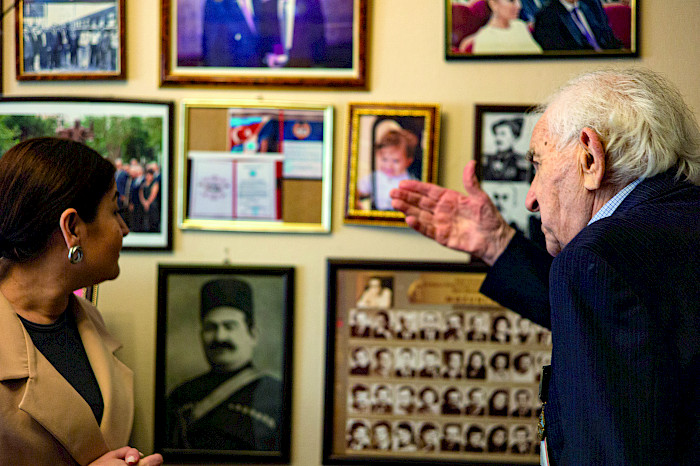
How did the idea of writing a ballet on the theme of oil come about? It's the only ballet in the world with such a theme, isn't it?
My wife's brother, Siyavush Mammadzadeh, was a writer and translator, and we were close friends. When the idea for the ballet arose, he and I visited the Oil Rocks to understand the life of the oil workers there. Siyavush wrote the libretto for the ballet, and choreog- raphers Rafiga Akhundova and Magsud Mammadov worked on it. The ballet was performed five times in Paris and 30 times in other cities of France, Monte Carlo, Luxembourg, and all over the USSR. In Mos- cow, it was showcased at Lenin's 100th anniversary.
What piece of writing is associated with memories dear to your heart?
Meetings with Heydar Aliyev left a significant mark on my heart. We were personally acquainted, and he awarded me the Shohrat Order. I dedicated a sym- phonic poem titled “Həmişə bizimləsən” ("You Are Always with Us") to him. Later, I received the Sharaf Order from Ilham Aliyev.
Can you be called a happy person?
I am a very happy person who has accomplished a lot in life. I have lived a rich life and raised two children. My son, Vahid, graduated from the Faculty of Philosophy at Lomonosov Moscow State University. My daughter, Nigar, worked at the Academy and was an Arabist scholar, a pupil of Ziya Bunyadov. Aida Imanguliyeva supervised her thesis defence. Unfortunately, at the age of 34, she died suddenly from a blood disease. Her children live in Sweden, and I even have a great-grandson.


